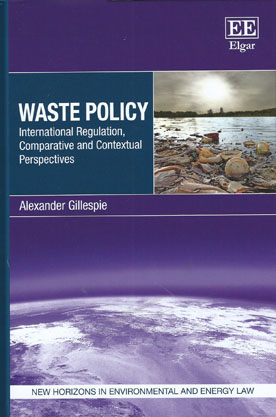
From human waste to nuclear waste, the question of how we must manage what we no longer want, in terms of either recycling or disposal, is one of the most pressing issues in environmental law.
Alexander Gillespie addresses the gaps in previous literature by incorporating economics, philosophy and the ideal of sustainable development in order to provide context to the surrounding legal and policy considerations for the management of waste.
The book’s premise is that all forms of waste are expanding exponentially, and are often of a hazardous nature. The author examines the size of the problem, considers how it is evolving, and assesses the legal and political implications. He then shows that existing solutions to reducing consumption and recycling are limited, and concludes by discussing potential ways forward.
Students and scholars with an interest in environmental law at the national, regional and international level will find this book to be of use. This book will also be of interest to practitioners interested in solving the issues surrounding waste and recycling.